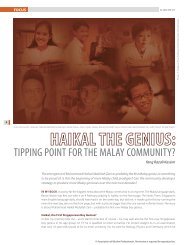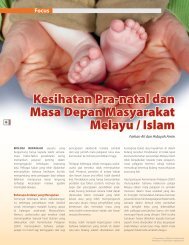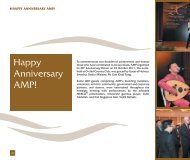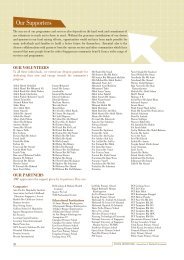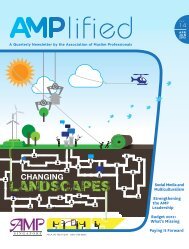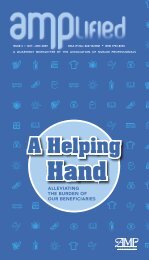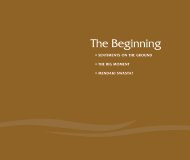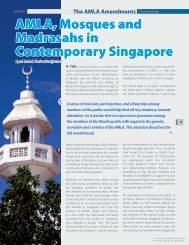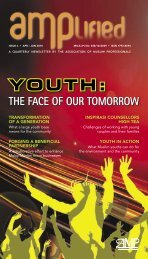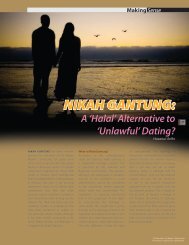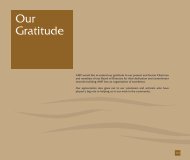The AMLA Amendments - Association of Muslim Professionals
The AMLA Amendments - Association of Muslim Professionals
The AMLA Amendments - Association of Muslim Professionals
Create successful ePaper yourself
Turn your PDF publications into a flip-book with our unique Google optimized e-Paper software.
KARYAWAN<br />
<strong>The</strong> <strong>AMLA</strong> <strong>Amendments</strong> Social Resilience<br />
Judge usually directs police to investigate the matter. After the<br />
police has done a cursory investigation (so far, records have<br />
shown that police investigations have not been effective), the<br />
magistrate will then direct the complainant to frame criminal<br />
charges against the accused person. <strong>The</strong> matter then goes to<br />
trial. If found guilty, the accused will be imprisoned.<br />
K: What are the difficulties and problems with the<br />
current enforcement method or regime and how<br />
have the amendments reduced or solved some <strong>of</strong><br />
the problems<br />
HM: Civil proceedings involving the two steps are expensive and<br />
lengthy. <strong>The</strong> first step is unnecessary. It is expensive and time<br />
consuming and not at all user-friendly. It cannot be done by<br />
laypersons without much difficulty. <strong>The</strong> services <strong>of</strong> lawyers are<br />
usually required and this adds to the costs.<br />
If the amount <strong>of</strong> mutaah and nafkah eddah is small or insignificant,<br />
it is not worthwhile to pursue the matter in civil court as the cost<br />
involved may exceed the mutaah and nafkah eddah due to the exwives.<br />
Now that the first step has been removed, complainants only<br />
have to go straight and directly to the second step, that is, bankruptcy<br />
proceedings, recovery <strong>of</strong> debts, contempt proceedings, etc.<br />
It is particularly useful in cases where one party refuses to comply<br />
with orders on children. An example is when a wife refuses to let<br />
her ex-husband see or have access to the children although SYC<br />
ordered access to the ex–husband. Another example is when SYC<br />
had ordered that the ex-husband deliver the child to the ex-wife but<br />
he refuses to do so.<br />
<strong>The</strong> amendments making orders on mutaah and nafkah eddah<br />
enforceable in Family Court is very useful as wives can now go to<br />
Family Court, pay $1.00 to lodge a complaint if their ex-husbands do<br />
not pay the mutaah and nafkah eddah and if the husbands are found<br />
to have deliberately refused to pay the mutaah and nafkah eddah for<br />
no good or apparent reason. Under such circumstances, he can be:<br />
• imprisoned; and<br />
• his monthly salary can be deducted directly and paid straight<br />
into the ex–wife’s bank accounts for the payment <strong>of</strong> mutaah<br />
and nafkah eddah ordered. <strong>The</strong> threat <strong>of</strong> imprisonment has<br />
been proven to be an effective deterrent to ex-husbands<br />
who may not want to pay the mutaah and nafkah eddah, as<br />
ordered by SYC. <strong>The</strong> mechanism where the ex-husband’s<br />
salary can be deducted directly so that the mutaah and<br />
nafkah eddah payable to his ex-wife could be paid straight<br />
to her is also a very effective enforcement method.<br />
<strong>The</strong> enforcement mechanism in Family Court is cheap,<br />
convenient and user-friendly. Services <strong>of</strong> a lawyer are not<br />
always necessary. Laypersons can conduct the proceedings by<br />
themselves, thus massively reducing the costs. Enforcement <strong>of</strong><br />
SYC orders via criminal proceeding is not particularly useful as<br />
what the complainant desires and wants is for the recalcitrant<br />
party to make the payment due to her. Imprisoning her exhusband<br />
if he fails to pay the mutaah and nafkah eddah is thus<br />
not useful, as she will probably not receive the money from him.<br />
<strong>The</strong> magistrate’s complaint process is also lengthy and <strong>of</strong>ten<br />
involves a great deal <strong>of</strong> delay and money, as it <strong>of</strong>ten requires the<br />
services <strong>of</strong> a lawyer to draft the charges and conduct the trial.<br />
Hence, the enforcement <strong>of</strong> SYC orders by civil proceedings. This<br />
removes the step <strong>of</strong> registering the SYC order in the District Court<br />
and making orders on mutaah and nafkah eddah enforceable in<br />
Family Court and are therefore helpful.<br />
K: What is the usefulness <strong>of</strong> the creation <strong>of</strong> the post<br />
<strong>of</strong> Deputy Registrar<br />
HM: <strong>The</strong> Deputy Registrar will take over the role <strong>of</strong> the Registrar when<br />
the latter is absent or away. Currently, the Judge or President takes<br />
over the Registrar’s cases when he or she is away.<br />
<strong>The</strong> post <strong>of</strong> Deputy Registrar is useful because it relates to the<br />
appeals procedure. If a litigant is unhappy or dissatisfied with any<br />
orders made whether by the Registrar or the Judge <strong>of</strong> SYC, he/she<br />
can lodge an appeal against that order.<br />
<strong>The</strong> rules are that if any litigants are unhappy or dissatisfied with<br />
orders made by the Registrar, he or she appeals against the Registrar’s<br />
orders in the SYC. However, if the Registrar is not in Court for any<br />
reason, her cases are taken over by the Judge or President.<br />
Appeals against the Judge or President’s orders cannot be made<br />
in SYC. Appeals against the Judge or President’s orders must be<br />
made at the Appeal Board. This process is expensive, lengthy and<br />
complicated. <strong>The</strong> appeal fees alone are $1,264.00. <strong>The</strong> creation <strong>of</strong> the<br />
post <strong>of</strong> Deputy Registrar therefore eliminates the necessity to lodge<br />
appeals against the Registrar’s orders at the Appeal Board. <strong>The</strong> appeals<br />
can be done at the SYC, which makes the process cheaper and less<br />
complicated with less delay.<br />
K: What can be concluded from these<br />
amendments<br />
HM: <strong>The</strong> amendments are expected to come into effect in<br />
February 2009. <strong>The</strong>y, are much welcomed and much awaited.<br />
<strong>The</strong> amendments are useful and very helpful to those who are<br />
divorcing and have been divorced. <strong>The</strong>y will go a long way to<br />
alleviate some <strong>of</strong> the enforcement <strong>of</strong> SYC orders, which many<br />
are currently facing and encountering. <strong>The</strong> amendments are<br />
therefore useful in the community’s long-term drive to tackle<br />
problems arising from early marriages or divorce.<br />
23



